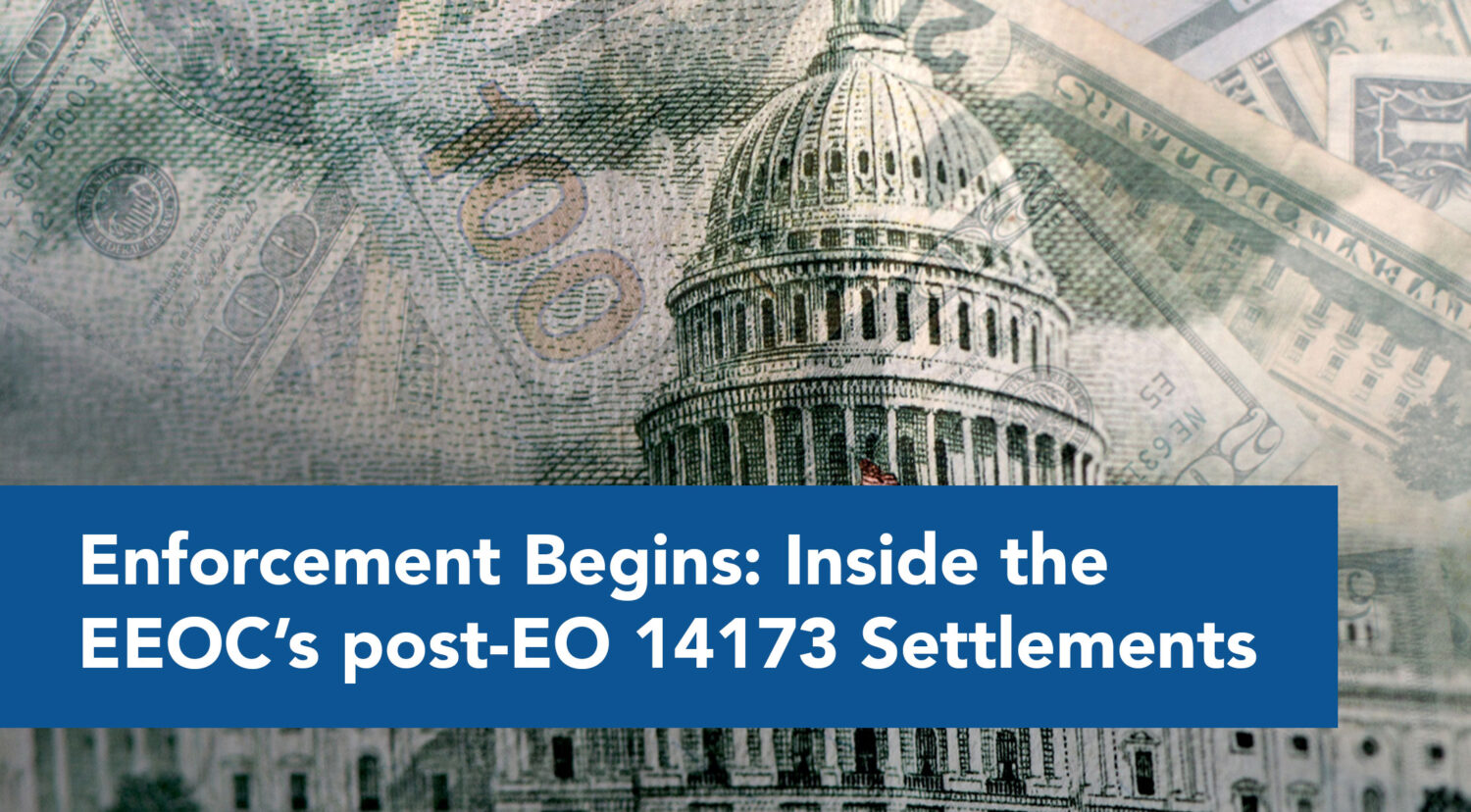

When Executive Order 14173 was issued in January 2025, many employers assumed that the revocation of Executive Order 11246 marked the end of federal oversight of affirmative action and diversity initiatives. Eight months later, that assumption has been proven dangerously wrong.
While the structure of oversight has changed, enforcement has not disappeared. It has shifted. The Equal Employment Opportunity Commission (EEOC), working in coordination with the Department of Justice (DOJ), has taken the lead in enforcing Title VII–based prohibitions on discrimination. The result: a new wave of post-EO 14173 settlements that reveal how the government intends to uphold anti-discrimination standards in the post-affirmative-action era.
From Plans to Proof: The EEOC’s New Enforcement Lens
Under EO 14173, contractors are no longer required to maintain traditional Affirmative Action Plans for Women & Minorities, Instead, they must certify that their employment practices are free from discrimination and comply with all applicable federal civil rights laws.
This certification requirement has become the new enforcement grip. When a contractor certifies compliance, that statement now functions as a binding attestation under Title VII and the False Claims Act (FCA). If the government later finds that employment decisions were influenced by protected characteristics or that the certification was false, the organization may face both civil rights liability and potential FCA exposure.
In other words, EO 14173 replaced the paperwork of compliance with the accountability of attestation.
The First Wave of Settlements: A Warning Shot
Since March 2025, the EEOC has quietly resolved several high-profile cases illustrating how enforcement will proceed under the new framework. Among them:
- Bigfoot Energy Services (2025): Settled allegations that hiring and promotion practices favored male applicants over equally qualified female candidates. The company agreed to pay $250,000 in back pay and damages and to overhaul its selection process.
- Iron Mountain Energy (2025): Agreed to a $300,000 settlement following claims of racial favoritism in a management training program intended to increase “diversity representation.” The EEOC found that the program’s eligibility criteria violated Title VII by explicitly considering race.
- Multiple regional employers have also entered into conciliation agreements addressing DEI-related practices that inadvertently excluded or advantaged particular demographic groups.
In each case, the EEOC emphasized a consistent principle: intentional or unintentional discrimination cannot be excused by diversity goals. The Commission has made clear that programs motivated by race or gender, even under the banner of inclusion, must be re-evaluated for Title VII compliance.
A Shift in Tactics: Financial Settlements Before Audits
Under EO 14173, enforcement has moved beyond traditional compliance evaluations. Instead of waiting for scheduled audits, the EEOC and DOJ are initiating investigations based on certification data, public or whistleblowers’ complaints, and inconsistencies in contractors’ statements.
This strategy allows agencies to act more swiftly and seek financial settlements or corrective action without the lengthy audit process that defined the OFCCP era. The result is a faster, more direct form of accountability and one that carries broader legal implications, because misrepresentations in certifications can trigger False Claims Act penalties.
This means that even if a contractor avoids an EEOC settlement, it may still face DOJ scrutiny for submitting a false attestation to the federal government. The financial exposure can be significant, with FCA penalties exceeding $25,000 per violation, plus treble damages.
The Message Behind the Settlements
The emerging pattern is unmistakable. The EEOC’s early cases have focused on three main areas:
- Hiring and Promotion Bias: Practices that overtly or implicitly favor one group over another, even with positive intent.
- Training and Development Programs: DEI initiatives that condition participation on demographic traits.
- Certification Misrepresentation: Contractors that claim to operate discrimination-free workplaces while maintaining questionable practices.
These cases send a clear message: the government is now enforcing anti-discrimination laws through financial accountability rather than procedural audits. For federal contractors, this marks a shift from “prepare your plan” to “prove your integrity.”
How Contractors Can Prepare
Federal contractors can take immediate steps to mitigate risk:
- Review all hiring, promotion, and DEI programs to ensure they are neutral, merit-based, and consistent with Title VII.
- Conduct an internal Employment Practices Audit (EPA) or Merit-Based Opportunity Program (MBOP) review to identify potential areas of bias or exposure.
- Document all policies and findings that support your nondiscrimination certification.
- Train leadership and HR staff on how DEI initiatives can comply with, rather than conflict with, federal law.
- Engage legal counsel or compliance experts before submitting bids under the updated solicitation clauses.
Looking Forward
As the first year under EO 14173 unfolds, the EEOC’s actions are making one thing clear: enforcement is here, and it’s evolving. Instead of formal audits and data submissions, the government is leveraging attestations, financial settlements, and legal accountability to achieve the same goals that once fell under affirmative action.
For federal contractors, the path forward is not about retreating from inclusion, it’s about building compliance systems grounded in fairness, transparency, and merit.
Join HR Unlimited’s upcoming Roundtable Discussion with former OFCCP and EEOC officials to hear firsthand how EO 14173 is being interpreted, enforced, and what your organization must do to remain compliant. Learn more about this webinar
At HR Unlimited Inc., we help federal contractors and employers navigate complex compliance requirements while building stronger, more inclusive workplaces. If you’re ready to strengthen your compliance and equity efforts, contact us today to learn how we can support your EEO and non-discrimination goals.



